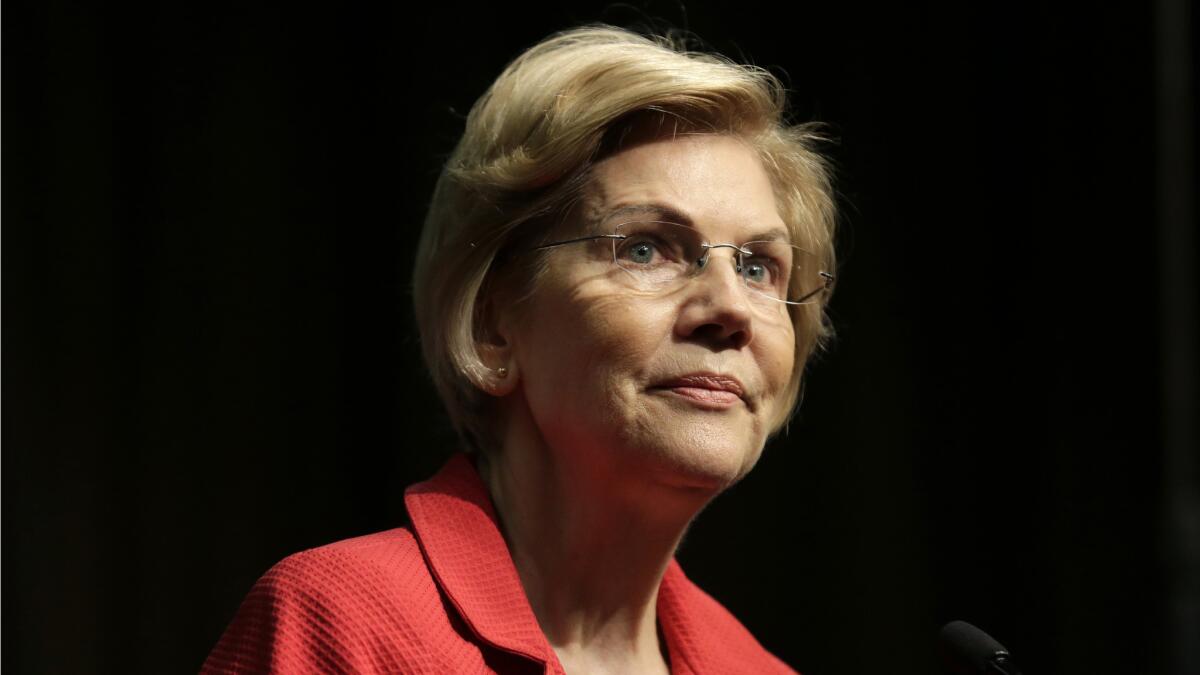Elizabeth Warren drafting legislation to reverse ‘mega-mergers’

- Share via
Sen. Elizabeth Warren (D-Mass.) is drafting a bill that would call on regulators to retroactively review about two decades of “mega mergers” and ban such deals going forward.
Warren’s staff recently circulated a proposal for sweeping anti-monopoly legislation, which would deliver on a presidential campaign promise to check the power of Big Tech and other industries. Although the Trump administration is currently exploring their own antitrust probes, the proposal is likely to face resistance from lawmakers.
According to a draft of the bill reviewed by Bloomberg, the proposal would expand antitrust law beyond the so-called consumer welfare standard, an approach that has driven antitrust policy since the 1970s. Under the current framework, the federal government evaluates mergers primarily based on potential harm to consumers through higher prices or decreased quality. The new bill would direct the government to also consider the impact on entrepreneurs, innovation, privacy and workers.
Warren’s bill, tentatively titled the Anti-Monopoly and Competition Restoration Act, would also ban non-compete and no-poaching agreements for workers and protect the rights of gig economy workers, such as drivers for Uber Technologies Inc., to organize.
A draft of Warren’s bill was included in an email Monday from Spencer Waller, the director of the Institute for Consumer Antitrust Studies at Loyola University Chicago. Waller urged fellow academics to sign a petition supporting it. He said Warren was working on the bill with Rep. David Cicilline (D-R.I.), the most prominent voice on antitrust issues in the House. Waller declined to comment on the email.
Representatives for Cicilline and Warren declined to comment. The existence of the bill and Warren’s support of it were reported earlier this week by the technology publication the Information.
In Washington, there is some support across the political spectrum for increased antitrust scrutiny of large technology companies. Warren positioned herself as a leader on the issue this year while campaigning on a plan to break up Big Tech. She has repeatedly called for unwinding Facebook Inc.’s acquisitions of WhatsApp and Instagram, along with Google’s purchase of YouTube and advertising platform DoubleClick.
It’s not clear when a bill would be introduced or whether it would move forward in its current form. Cicilline has said he would not introduce antitrust legislation until he concludes an antitrust investigation for the House Judiciary Committee in early 2020.
Amy Klobuchar, a senator from Minnesota who’s also vying for the Democratic nomination, has pushed legislation covering similar ground. Klobuchar plans to introduce additional antitrust legislation soon, according to a person familiar with the matter who wasn’t authorized to discuss the plans and asked not to be identified.
Any proposal would face significant hurdles to becoming law, and Warren’s version could be particularly problematic because it promotes the idea that antitrust enforcement is equivalent to being against big business, said Barak Orbach, a law professor at the University of Arizona who received a draft of the bill. “The way I read it is that Elizabeth Warren is trying to make a political statement in the course of her campaign,” Orbach said. “It’s likely to have negative effects on antitrust enforcement, so I just don’t see the upside other than for the campaign.”
The bill proposes a ban on mergers in which one company has annual revenue of more $40 billion, or in which both companies have sales exceeding $15 billion, except under certain exceptions, such as when a company is in immediate danger of insolvency. That would seemingly put a freeze on many acquisitions for Apple Inc., Alphabet Inc., Facebook, Microsoft Corp. and dozens of other companies. The bill would also place new limitations on smaller mergers.
Chris Sagers, a law professor at Cleveland State University, said the proposal would serve as an effective check on corporate power. “I don’t think you’ll have new antitrust policy until Congress says the courts have incorrectly interpreted the statutes,” he said. “Someone has to do what Elizabeth Warren is doing.”
(Michael Bloomberg is also seeking the Democratic presidential nomination. Bloomberg is the founder and majority owner of Bloomberg LP, the parent company of Bloomberg News.)






